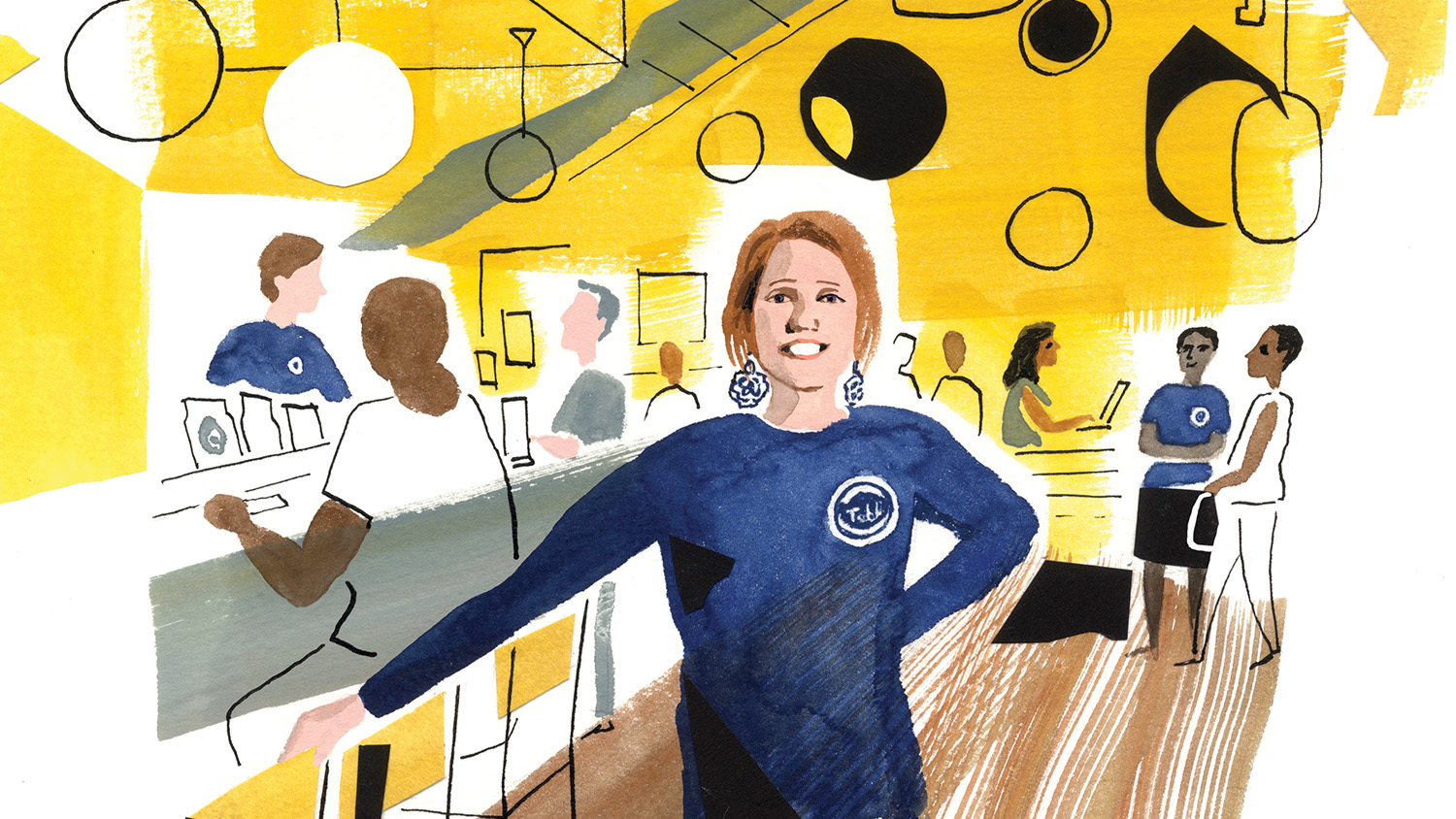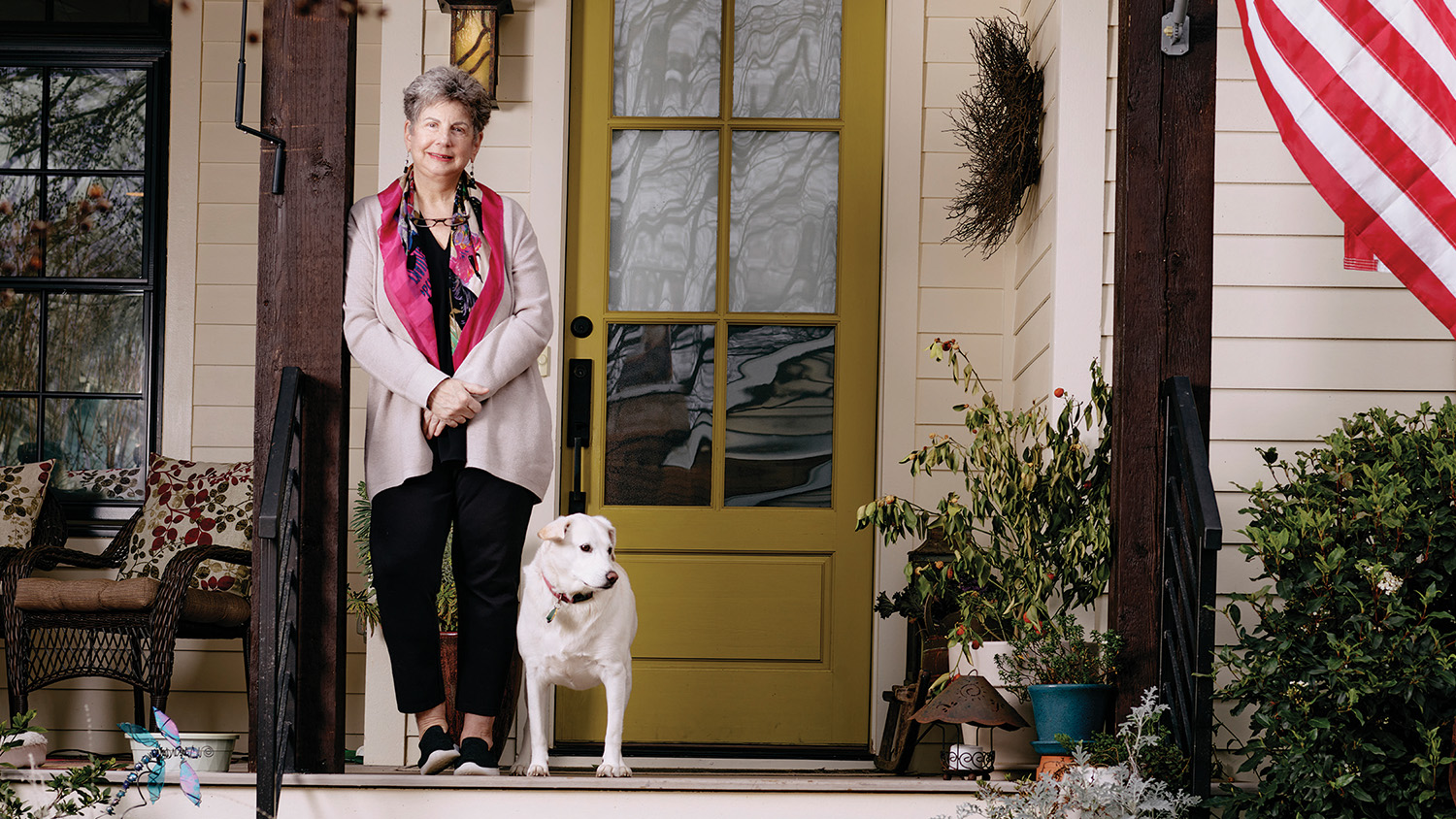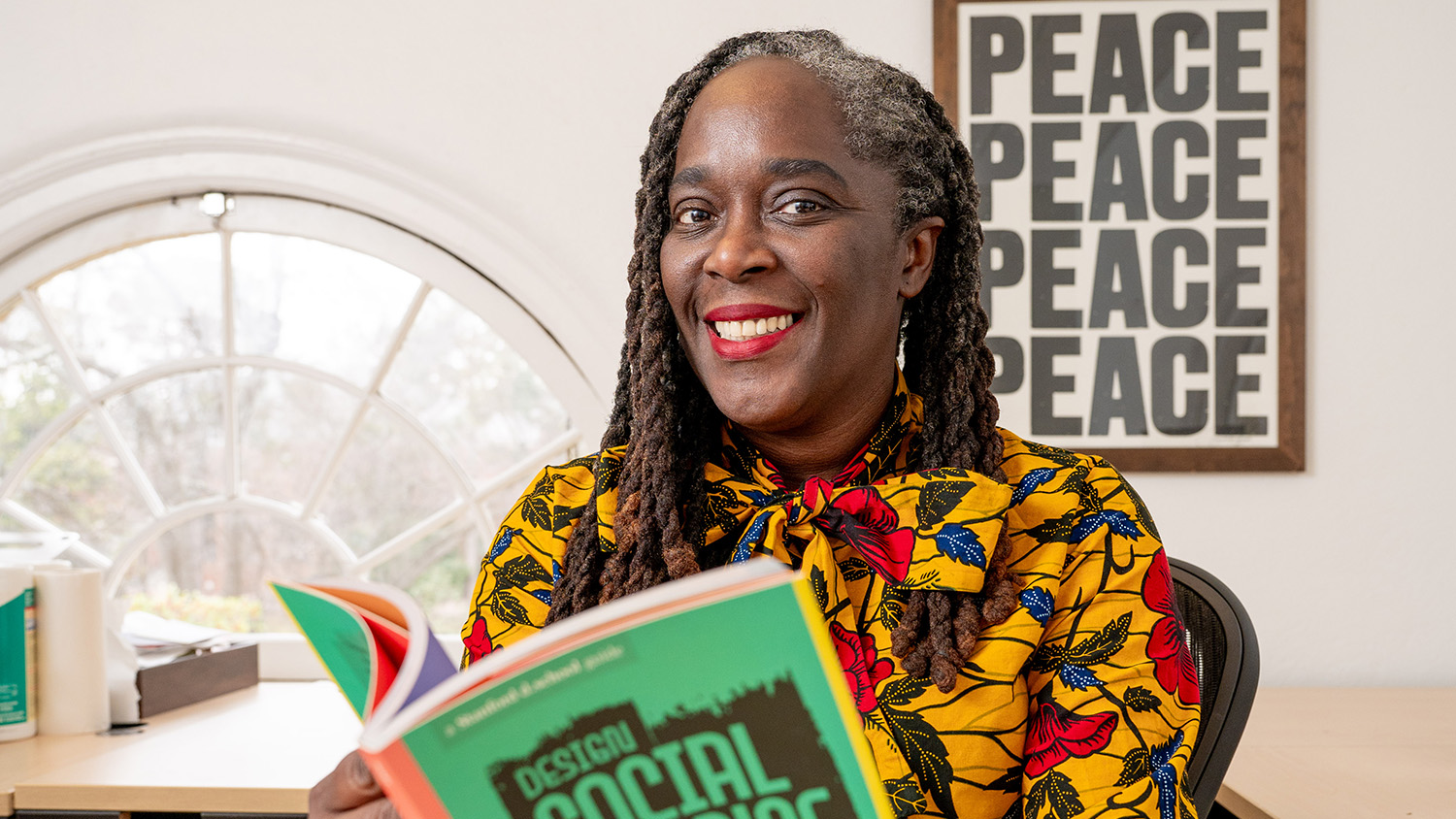Pull up a Chair
Maggie Kane ’13 makes sure there’s a place at her table for everyone. Illustrations by Sarah McNemey

By Sarah Lindenfeld Hall
For Maggie Kane ’13, relationships are built around food. Time with friends and family means swapping stories and laughing over a shared meal or a cup of coffee. So, for Kane, going out to eat with the people she worked with daily has always been an obvious way to get to know them better.
But Kane’s lunch dates weren’t always other young professionals, heading to some trendy downtown Raleigh eatery. They were the people who spent their days at the shelter Kane managed in downtown Raleigh because they had no other place to go. They were homeless.
At first, Kane, 29, would eat with them at soup kitchens where they’d fill their stomachs, but little else. “We plopped down, we’d get a plate. We didn’t choose what we wanted for a meal,” Kane says. “Then we would have to eat in five minutes.” Kane pointed out that soup kitchens sometimes have to feed 300 people an hour. “They do what they can,” she says. “But what I saw was so different than my life experience.”
Soon, she was taking them out to eat instead, letting them pick the spot. Often, it was Golden Corral. When she asked them why, the reasons were simple. They were greeted when they walked in. They got to choose what they wanted. And someone came to ask how they were doing. “They make sure you’re OK,” she says.
And then, she says, “I started thinking about what we can do.”
Her answer was A Place at the Table, the pay-what-you-can restaurant she opened in downtown Raleigh in 2018. The bright and homey café is in a former coffee shop just around the corner from some of Raleigh’s new and expensive apartment buildings. The meals are freshmade, with choices ranging from smoky chipotle pimento cheese sandwiches to chai Belgian waffles. Diners can pay a suggested price, and those who choose to can pay it forward, adding extra money or buying a wooden token for $10 to pass on to the next person who needs a free meal. Those who can’t pay can still eat, and can also volunteer in the kitchen in exchange for their meal.

In its first year, A Place at the Table gave away about 20 percent of the 40,000 meals it served, typical of other pay-what-you-can restaurants around the country. And customers opted to pay it forward with a tip or a token purchase more than 25,000 times. “That means that people are intentionally wanting to help and be part of the community,” Kane says. What’s more, the café was slated to expand into space next door this spring, doubling its seating and adding a full kitchen and expanded menu.

Scott Phillips, who was the Presbyterian campus minister at NC State when Kane was a student, still remembers when she told him she wanted to start a restaurant that serves free meals. “I thought, ‘This is a crazy idea,’ ” Phillips says. “But if anybody’s going to make it happen, Maggie is.”
Volunteering and Questioning
As a teenager, Kane began noticing that she lived differently than people who didn’t have the trappings of her middle-class upbringing. Questions popped up as she traveled on overseas mission trips and volunteered at local soup kitchens with her church’s youth group. “I just always wondered why I was so fortunate,” she says. “Why did I live in a middle-class home, have whatever I wanted, any food that I wanted, could go anywhere I wanted — but I’d be serving kids at a soup kitchen who looked the same as me?”
“I just always wondered why I was so fortunate. Why did I live in a middle-class home, have whatever I wanted, any food that I wanted, could go anywhere I wanted — but I’d be serving kids at a soup kitchen who looked the same as me?”
– Maggie Kane ’13
And, at the soup kitchens, all she could do was serve. There was little opportunity to say even a few words to the people walking down the line, let alone have a real conversation. “We literally had this physical barrier between us,” she says. Afterwards, she and her group of friends would go to Chick-fil-A. “I always wondered, ‘Why?’ There was something unfair about this system.”
Still, working with the homeless in Raleigh wasn’t part of her plan when she arrived at NC State. During high school, Kane had spent several months in Italy, living with a host family as an exchange student. At NC State, she majored in international studies and took Italian classes, and at first envisioned a career in Italy teaching English or supporting missions.
But that changed after a mission trip to Jamaica with Presbyterian Campus Ministry during her sophomore year. Phillips encouraged students to reflect more deeply on their beliefs, and Kane immersed herself in the group. She volunteered so often with the ministry, Phillips says, that he would tell her to step aside so others could help.
While she was still in college, Kane began volunteering 30 hours a week at Love Wins, a day shelter that provided a place for homeless people to go during the day when overnight shelters were closed. She lived in a dorm room but made friends with people who had spent the previous night under a bridge. “We drank coffee together,” she says, “and talked about their hopes and dreams and my hopes and dreams.”
When Kane graduated — with several of the homeless people from the shelter in attendance for the ceremony — she took a full-time job with Love Wins. The work, managing a shelter that housed from 80 to 100 people a day, was all-consuming. But as she began to look for new ways to support the people she spent her days with, Kane began studying the pay-what-you-can restaurant model. She traveled to F.A.R.M. Café in Boone, N.C., a pay-what-you-can restaurant, to volunteer, bringing friends along. “I was kind of hoping they would all say, ‘Don’t do this,’’’ Kane says. “No one ever did.”
Renee Boughman, F.A.R.M Café’s executive director and chef, hosts a lot of people like Kane, who are eager to bring the concept to their town. “And then you never hear about them again,” Boughman says. “It really takes someone with drive and vision to understand that this is going to be a process . . . They have to be committed. Maggie had that — and, to me, unusually so at her age.”
Within a year, Kane had formed a small vision team. She was determined to be in downtown Raleigh, near homeless shelters, bus lines and busy offices. But it would take 18 months to find a location. An initial site on Hillsborough Street fell through, and then Kane was stymied by building owners and developers who said the café would draw an unsavory clientele. “People didn’t want us here,” she says. “And as Raleigh became more and more cool, it was easier to push poverty out.”
Kane was running out of steam during a beach trip in 2017. She remembers praying that she could find the right place for her new venture. That weekend, the tide turned. Within days, she had a salary, the title of executive director and a spot in a former coffee shop on Hargett Street. Named after a line from “For Everyone Born,” a song in the Presbyterian hymnal, A Place at the Table opened in January 2018.

More than the Meal
On a busy weekday at the restaurant, Kane is a whirlwind of activity. In a span of minutes, she moves from greeting first-time customers to restocking a basket with bags of potato chips to hugging a workout buddy sitting at the counter with a laptop open. “All of our prices are suggested,” she rattles off as more customers walk through the door. “We serve breakfast all day long. All of our sandwiches come with chips.”
Kane has a paid staff of 10, including a café manager, a chef and a volunteer coordinator. As the restaurant has fallen into a rhythm, she hopes to find more time for herself — for more travel, time with friends and family, and to pursue passions that range from working out to reading. She’s not sure what’s next. “I think founders stick around too long,” she says. “I do know that, eventually, I will move on and another great director will come in and be better for this place than I am. It will be obvious when that time is.”
A line forms at the register as volunteers, some there for a free meal and others who just wanted to help, take orders at the register and bring food to customers. Most diners pay with credit cards or cash, but a few exchange wooden tokens — which may have been picked up at shelter or from a nonprofit — for a free meal.

Sean Degnan, vice chairman of the café’s board, says guests who have paid for their meal sometimes want to know where the homeless people are — and a homeless person may be delivering their meal or sitting at the next table. There’s not a face of poverty, says Degnan, who owns Raleigh’s SoCa restaurant. “Just because you got up in the morning and got dressed and made yourself look presentable doesn’t mean you’re not experiencing something traumatic.”
“Just because you got up in the morning and got dressed and made yourself look presentable doesn’t mean you’re not experiencing something traumatic.”
– Sean Degnan
Nearby, Alaric Vines sits at the counter. He met Kane when he was staying at Healing Transitions, which offers shelter and recovery programs for people struggling with addiction. After volunteering at A Place at the Table for more than a year, he completed an apprentice culinary program at the café through Inter-Faith Food Shuttle, a Raleigh-based nonprofit, and landed a part-time paying job at the restaurant.
Seeing others with similar struggles come in for a meal or to volunteer encourages Vines to stay clean. “I can reach back and pull the next man up,” he says.
“At first, it was about the meal,” Vines says, “but it became more than that.”


